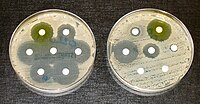
Photo from wikipedia
PURPOSE The emergence of antiseptic resistance and/or antiseptic-resistance genes in methicillin-resistant Staphylococcus aureus (MRSA) may result in failure of decolonization treatments. Plasmid-encoded efflux pump genes qacA/B and qacC (smr) confer… Click to show full abstract
PURPOSE The emergence of antiseptic resistance and/or antiseptic-resistance genes in methicillin-resistant Staphylococcus aureus (MRSA) may result in failure of decolonization treatments. Plasmid-encoded efflux pump genes qacA/B and qacC (smr) confer tolerance to chlorhexidine and quaternary ammonium compounds. The objective of this study was to develop and validate a multiplex real time-PCR assay for detection of antiseptic-resistance genes, apply the assay on 200 MRSA isolates and explore if carriage of these genes was associated with resistance to topical antibiotics. METHODOLOGY A SYBR-Green based multiplex real time-PCR assay was developed to detect qacA/B, qacC, and mecA (internal control) simultaneously. The multiplex assay was compared against conventional single-plex PCR followed by agarose gel electrophoresis, using DNA from the first 73 MRSA isolates, followed by multiplex testing of the remaining 127 MRSA isolates. All 200 MRSA isolates were tested for susceptibility to mupirocin, retapamulin, neomycin, bacitracin and octenidine. The genetic diversity of the isolates was investigated by spa-typing. RESULTS The concordance between multiplex and conventional PCR, in assignments of qacA/B and qacC status were 99%(72/73) and 100%(73/73) respectively. Among 200 MRSA isolates, 48(24%) and 44(23%) were found to harbour qacA/B and qacC genes, respectively. These isolates remained susceptible to many common decolonization agents, except mupirocin. The predominant spa-types were t020 and t1081 (41 and 32 isolates respectively). CONCLUSION The real-time assay performed acceptably for the detection of qac genes. A high prevalence of antiseptic-resistance genes were detected in the MRSA isolates in our population and appeared to be associated with spa-type t1081.
Journal Title: Journal of microbiological methods
Year Published: 2018
Link to full text (if available)
Share on Social Media: Sign Up to like & get
recommendations!